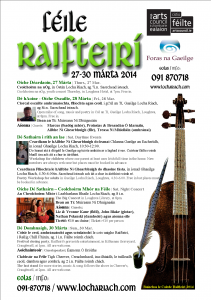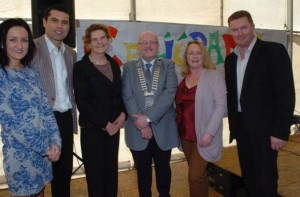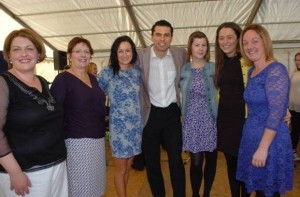Gaelscoil Mhichíl Uí Choileán ar Lá Lus an Chromchinn
March 31, 2014
Foghlaim faoi na Meáin Chumarsáide agus an Raidió i Raidió na Life le Cúrsa Leibhéal 3 QQI/FETAC
March 31, 2014
Comhghairdeas Cumann Gaelach Marino
March 31, 2014
At the Glór na nGael national awards on Saturday night last a cheque for 1,000 euro was presented to the Cumann Gaelach from Marino Institute of Education as the best Cumann Gaelach in its category among third level institutions. Four hundred guests were in attendance and the presentation itself was made by the Minister of State for Arts, Heritage and the Gaeltacht Mr Dinny McGinley T.D. to Sarah Breathnach, Nora Ní Mhurchú and Paula Melvin. We congratulate them for gaining this recognition for all the work they have done since the beginning of the year and for the work that the Cumann Gaelach has done in Marino over the years.
Féile Raifteirí
March 31, 2014
Fios Físe ag lorg do thuairimí
March 31, 2014
Cuireadh chun aiseolas a thabhairt maidir le cur chun cinn sláinte mheabhrach agus folláine i mbunscoileanna
March 27, 2014
Public meeting re Irish-medium post-primary education in Dublin 15 on March 26th
March 27, 2014
The public meeting organised by parents in the Crowne Plaza in Blanchardstown to assess the demand for an Irish-medium post-primary school in Dublin 15 was a great success, with a large crowd in attendance and a lot of interest shown in the campaign. An expression of interest form was handed out to everyone on the night and you can download a copy of the form here:
The meeting discussed the advantages of Irish-medium at post-primary level, the process that the Department of Education and Skills have in place to establish new schools and the growth of interest in Irish in Dublin 15, including naíonraí, schools, classes for adult learners, social events and more. There was a discussion also on the difference between an independent Irish-medium school and an Irish-medium Aonad, and it was confirmed that an Irish-medium post-primary would be open to all applicants, regardless of their linguistic, cultural or economic backgrounds.
The next step is to establish a committee to steer the campaign, and anyone interested in taking an active role is asked to contact the Development Officer in Gaelscoileanna Teo. on 01 8535193 or by emailing clare@gaelscoileanna.ie.
Darren J. Prior attended the meeting on behalf of Raidió na Life and you can listen back to his report here.
Gaelscoil Dhochtúir Uí Shúilleabháin celebrating 20 years
March 26, 2014
Comhghairdeas mór leis an scoil as gach rud atá bainte amach acu le 20 bliain anuas! Seo thíos scéal maidir leo a foilsíodh sa Southern Star:
It was two decades ago on March 15th that the Gaelscoil in Skibbereen had its humble first beginnings.
‘It started off in Townshend Street, where the Skibbereen Community Resource Centre is now, and moved to the campsite in Tragumna Road,’ said the principal, Aisling Ní Néill, who is hoping that Gaelscoil Dhochtúir Uí Shuilleabháin will one day have a permanent and purpose-built facility.
‘Our premises at Gortnacloghy, at the rear of Rossa College, is suitable for our needs at present,’ said Aisling, who was appointed principal in 2008, ‘because it is large enough to accommodate our 66 pupils, our three teachers, our two special education teachers, and our naíonra playschool, which accommodates up to 20 children and their four leaders.
‘When the school began there were just 21 pupils enrolled, but that number has increased year-on-year because of the growing interest in our Irish language and culture.
‘It is not just a West Cork phenomenon: the increase in popularity of Gaelscoileanna is evident right throughout the country.’
It has been proven that the most successful approach to learning a language is to be completely immersed in it. But that is just one of the reasons why these schools have become so popular: There is also an ethos in the smaller Gaelscoileanna that parents consider to be a good fit for their children.
Aisling said: ‘We are a Catholic primary school but we run an ethical education programme in tandem with that to cater for everybody regardless of their faith.
‘The ethical education programme is similar to the programme used in other multi-denominational schools, such as “Educate Together”, and gives pupils a broad introduction to other religions and cultures.
‘By being immersed in the language from their very first day the pupils learn the language and end up speaking the language without any great difficulty so it is, within a matter of weeks, very easy for them to do all of their subjects through the medium of Irish.
‘Parents initially worry that learning different subjects through Irish might be difficult,’ said Aisling, ‘but that is not the case because speaking Irish becomes second nature to them.’
But it is not just the curriculum that keeps them interested: extra-curricular activities, such as the puppetry club, the school choir, as well as learning the accordion, tin whistle and guitar are fun events that keep them happily chatting as Gaeilge.
‘Drama is a big part of the school’s extra-curricular programme: every year Gaelscoil Dhochtúir Uí Shuilleabháin puts on a drama performance as part of it Seachtain na Gaeilge celebrations.
This year, the pupils performed in a competition, Coirm, in Fermoy and won two awards – one was for their use of props, and the second was for music.
The children and their parents made the puppets and anyone who has seen them has been struck by the fact that they are evocative of old Irish legends, such as the stories of Oisin and Tir na nÓg, as well as the ever popular Children of Lir and the Brown Bull of Cooley.
At Gaelscoil Dhochtúir Uí Shuilleabháin the children also have fun while learning about the environment and they are delighted to be working towards achieving their third Green Flag for water conservation.
The school has recently expanded its school garden courtesy of Rossa College. In time, the plot of land will be used to grow vegetables, as well as flowers to adorn the school.
According to the principal, Aisling Ní Néill, ‘the education of young people has evolved and changed over the last 20 years and today, I believe, it is more child-centred, more active and more inclusive than ever before.
‘Children learn how to work as part of a team and the school’s sports programme is a big part of that. The children also come to understand that learning goes beyond what can be found in books. They take an interest, not just in their school, their community and their environment, they also learn to take a world view too.
‘But for now we will be spending the next week or two preparing for our 20th anniversary celebrations,’ said Aisling.
All past parents, pupils and friends of Gaelscoil Dhochtúir Uí Shuilleabháin are welcome to gather at the school on Saturday, March 15th from 2pm until 5pm to celebrate the 20th anniversary.
The Cork sports personality, Sean Óg Ó hAilpín, and Paidí Ó Lionaird of TG4 fame will be the guest speakers on the day. It promises to be a relaxed social event with plenty of good food, drink and music to mark the occasion.
Jackie Keogh, Southern Star
Bored Games – cluichí i nGaeilge
March 26, 2014
Minister Quinn secures Cabinet approval for drafting of Admissions to Schools Bill
March 25, 2014
Bill will make the school enrolment process more structured, fair and transparent
The Government has today approved the drafting of the Education (Admissions to Schools) Bill 2014. This new legislation aims to ensure that the enrolment process in all primary and post-primary schools is inclusive, transparent and fair.
A key objective in designing a new regulatory framework for school admissions is to create greater confidence for parents that the criteria laid down by schools for enrolling pupils is consistent, reasonable and applied equitably across the board.
ESRI research shows that the majority of schools, around 80 per cent, admit all the pupils who apply for enrolment. In these cases, the new regulatory framework will have a marginal impact.
Where the new Bill will play an important role is in the 20 per cent of schools where there is over-subscription.
Minister Quinn said, “The aim of this new Bill is to inspire the same levels of confidence in the enrolment of pupils in schools as the CAO system inspires for those who are applying for limited places in third level colleges.”
“I believe that the vast majority of our schools are inclusive and welcoming places. The Admissions to Schools Bill will provide an over-arching framework to ensure that how schools decide on who is enrolled and who is refused a place in schools is more structured, fair and transparent.”
The Oireachtas Joint Committee on Education and Social Protection recently published its report on the Draft General Scheme; this followed public hearings at the committee involving parents and education partners among others. The recommendations from the Committee will be considered further in the context of the drafting of the Bill.
Among the provisions in the new Bill, will be a requirement for all schools to make an explicit statement in their admissions policy that they will not discriminate against an applicant for admission on the grounds of disability, special education needs, sexual orientation, family status, membership of the traveller community or race.
The Bill will also enable the National Council for Special Education in respect of children with special educational needs and the Child and Family Agency in respect of other children to designate a place for a child for whom no school place is available.







